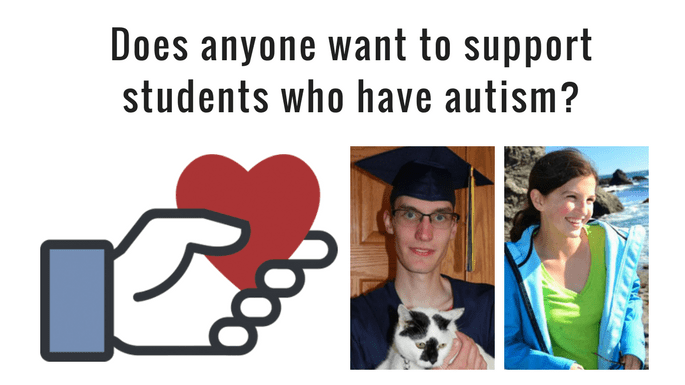This guest post is by Andrew Gossett, a young man on the autism spectrum who has been accepted and will be attending Winthrop University majoring in Sports Management with a minor in Music. Andrew is applying for the Spring 2019 Making a Difference Autism Scholarship via the nonprofit KFM Making a Difference. You can read more about the organization and how to apply for our scholarship here. You can help our scholarship program continue to help these students by making a donation to our scholarship fund here (the majority of our scholarship program is ran through donors from our community such as yourself so no matter if you could donate anything, whether it be $5 anywhere up to $5,000 it would be making a difference!).
I will admit that I cannot remember an extended time in my life that was tough for me because of autism, but there have definitely been shorter periods of time that having autism made certain tasks tougher to accomplish. Having these unique aspects of my personality and actions are not necessarily bad as long as you have the strategies and work ethic to overcome the hurdles that the diagnosis gives you. However, I almost definitely could not have gotten to where I have by myself. I had therapists who taught me aspects of communication that came naturally to others, and friends and family who took me for who I was and encouraged me along my path to where I am today. I have been able to take and use advice from others (my conductors), add on to that advice with similar ideas that I came up with (my instincts), and follow paths traveled by friends and family when doing different tasks (my roadmap).
As you may realize by references I’ve already made, I am quite the “music nerd”. I characterize people who give me advice as my conductors, because in large classical groups, such as a concert band or symphony orchestra, a conductor makes sure that everyone is in time and tune with him or her and the rest of the players, so that beautiful music can be made. Especially in my younger years, and still today to an extent, communication has been one of my toughest aspects of life to get a firm grasp of. I had a decent stutter and a few pronunciation errors, as well as a somewhat hyperactive mind that couldn’t always think about what I should say and actually say it in quick succession without stuttering. Luckily, with the help of my multiple speech therapists that I went to for many years, those conductors showed me strategies to improve my communication skills into the future. My parents definitely helped with reinforcing the habits and strategies that the therapists had as well as giving a few from their own experiences. All of my various conductors were patient as they guided me on my unique journey of interacting with the community.
For most of my high school career, I have not been going to speech therapy, mainly because of my busy extracurricular schedule. However, their tips that have stuck in my mind since I have stopped regularly attending give a great platform for me to build my habits on as well as what to avoid. Another thing about me is that if I receive a big negative reaction from something that I say or do, it sticks in my head for a very long time, even though it may seem to some people like an overreaction. If my mind starts wandering, from time to time, a string of thoughts in my head may lead me to remembering one of those negative moments. It became so common that about a year and a half ago, after one of those incidents happened, I shared it with my mother, who suggested that I go to a therapist to try to find some strategies for those thoughts to stop happening or to see them in a positive light. I went to this therapist about eight times, and since then, those thoughts have been happening less, and when they do happen, I know that those few individual moments will not keep me from doing what I want to do in life. My communication instincts and mental instincts continue to push through tough times, whether educational, musical, or social, and make my path to success clearer.
In music, the “roadmap” or “form” is the path you take when reading a sheet of music. Whether you just read from left to right on each line, or repeat or skip a section, following the roadmap is a must to correctly play the music. In some cases, mostly in jazz music, there is not an exact form to follow, but there is a general idea of what to do. What exactly one does is up to the person that does it. Following the form in jazz music is what I relate to following paths of loved ones in life to an extent. For example, using appropriate manners was somewhat of a problem in my younger years, but through watching what others were doing (maybe multiple times) and sometimes people telling me those things specifically, I have gotten quite a bit better in that field. Like some other people, autistic or not, I am a visual learner and a kinesthetic learner, and by paying attention in class and asking questions along with a natural gift of understanding things easily (mostly math), I have been able to climb up to where I am academically.
As long as people with autism (and/or their parents) get help from others and use that help to shape their own successful life, then they can live life to their fullest potential just like any other person. Like music, all autistic diagnoses are unique.

Follow Kerry’s journey on Facebook, his Facebook Fan Page, & Instagram!
Kerry Magro, a professional speaker and best-selling author who is also on the autism spectrum started the nonprofit KFM Making a Difference in 2011 to help students with autism receive scholarship aid to pursue a post-secondary education. Help us continue to help students with autism go to college by making a tax-deductible donation to our nonprofit here.
Also, consider having Kerry, one of the only professionally accredited speakers on the spectrum in the country, speak at your next event by sending him an inquiry here. If you have a referral for someone who many want him to speak please reach out as well! Kerry speaks with schools, businesses, government agencies, colleges, nonprofit organizations, parent groups and other special events on topics ranging from employment, how to succeed in college with a learning disability, internal communication, living with autism, bullying prevention, social media best practices, innovation, presentation best practices and much more!

We’d also appreciate if you could take a minute to create a Facebook Fundraiser to support our nonprofit’s scholarship fund! You can learn more about how you can do just that here.














